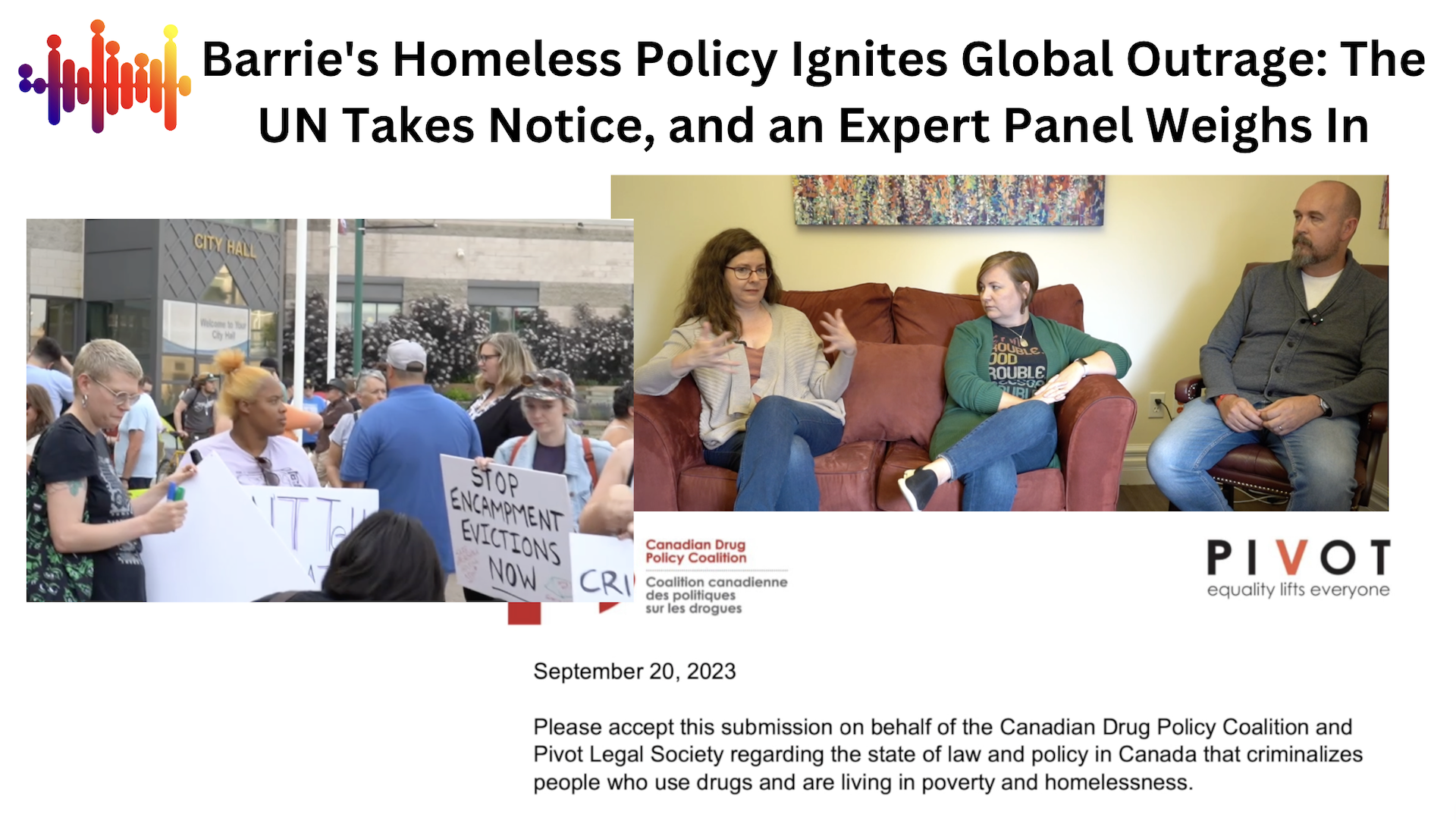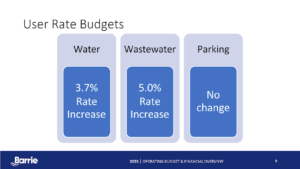In June, the City of Barrie stirred national controversy with its attempt to prohibit assistance to homeless individuals on public properties. However, overwhelming local and national outcry compelled the council to revisit their proposal. By the June 21 Council meeting, the contentious Bills 67 & 68, officially called the “Addressing Chronic Homelessness” Bills, were deferred back to the staff for reconsideration. However, community leaders and advocates for the homeless have criticized these bills, accusing them of criminalizing homelessness.
Yet, the sentiments expressed in the September 19 Community Safety Committee Meeting suggest that the council stance remains in place. Now, the city finds itself under global scrutiny, once again for negative reasons.
In response to a UN request for information on legislations and policies that unfairly target individuals living in poverty and experiencing homelessness, the Canadian Drug Policy Coalition furnished a comprehensive report pointing to Barrie’s anti-homelessness policies.
To shed light on the developments that have brought us to this juncture and to explore constructive solutions for a harmonious community, we convened a panel discussion. Our panelists included Jennifer van Gennip of Redwood Park Communities, community advocate Michael Speers, and Alyssa Wright from the Engage Barrie Organization.
May 17 motion –
The May 17 Direct Motion Without Notice, brought to the table by Councillors Bryn Hamilton and Sergio Morales, was framed as an initiative “to address chronic homelessness” in the Barrie City. This context set the stage for various community responses.
Michael Speers expressed his dismay at the Barrie City council’s decision. He criticized the council for its lack of transparency and believed that such an important issue demanded broader consultation with the public. He also hinted at a pattern of the council, particularly under the leadership of the current Mayor Alex Nuttall, to discuss matters behind closed doors, assemble supporters in advance, and then present decisions with limited scope for debate or dialogue. He said he was “shocked that they would try to try to do that but not not really surprised given the way the council is made up.“
Alyssa Wright of Engage Barrie pointed out an unexpected silver lining to the council’s move. “The fact that they did try to push it through as a direct motion without notice just rang alarm bells for many people who might not otherwise have been paying attention,“ she said. She it pulled in various community members and organizations that were not previously involved in addressing homelessness in the city.
Jennifer van Gennip recognized some beneficial elements within the motion, such as funding commitments for what’s commonly considered a social service challenge. “We had just a few weeks left of council before the summer break,” she said, expressing skepticism about the motion’s potential speed of progress, especially considering the inclusion of a public meeting and the imminent council summer recess.
Speers expressed his concerns regarding the motion titled “addressing chronic homelessness.” According to him, while there were positive elements related to funding goals, the details were rather vague. He stressed the importance of advocacy at different governmental levels but found some aspects of the motion puzzling. Wright was more pointed in her critique. She emphasized that if the motion was genuinely about addressing chronic homelessness, there should have been stipulations related to housing or sheltering. Instead, initiatives like warming and cooling centers, while potentially beneficial, do not address the root causes or offer long-term solutions. Speers further elaborated on what he believes to be the real goal of the motion: to “clean up the downtown.” He feels that the intent isn’t genuinely to solve the homelessness issue but rather to make the downtown area more aesthetically pleasing without addressing the underlying challenges faced by those experiencing homelessness.
Wright additionally highlighted a communication issue, noting that the portrayal of homelessness and open drug use as interconnected was not only misleading but also discriminatory, violating both the Canadian and Ontario Human Rights Codes. She said this conflation of drug use with homelessness is not only cruel but also contravenes established human rights standards. “Not all drug users are homeless. Not all homeless people are drug users,“ she said.
Bill 67 and 68: June 21 Meeting –
Following the May 17 meeting, the council introduced Bills 67 and 68, which were slated for discussion and potential approval at the June 21 Council meeting. Many felt that these proposed bills were aimed to deter people from assisting those in need. Speers, expressed skepticism about the city’s intentions. If the bylaws weren’t meant to criminalize assistance, he pondered, why propose them in the first place? When confronted with criticisms from various provincial and national agencies, the mayor and other officials seemed to shift their narrative, suggesting they were merely attempting to “modernize the language” of existing bylaws. Speers criticized this response as “gaslighting.”
Wright pointed out that the existing bylaws specifically exempted acts of charity, like giving out food or water, from any restrictions. However, the proposed Bills 67 and 68 deliberately removed those exemptions. Wright bluntly termed this inconsistency as a “lie,” differentiating between mere political spin and outright deception.
van Gennip emphasized that the staff writes bylaws based on the council’s directions. When the council claimed the bylaws didn’t reflect their intentions, it raised questions about their transparency and honesty. She said by-laws also infringe on human rights. Furthermore, attempts to regulate panhandling through signage also failed, with the signs being quickly taken down. This series of events showcased a city council seemingly out of touch with both legal frameworks and public sentiment.
Anti-pan handling signs –
After the Community Safety Committee Meeting on September 19, van Gennip pointed out the anti-panhandling signs that had been erected in Barrie. She said their installation was not discussed during the meeting. Interestingly, these signs bore a striking resemblance to those of CanadaHelps.org, suggesting that the charity was spearheading an anti-panhandling campaign. CanadaHelps quickly distanced itself from this initiative and the City was forced to take down the signs.
Wright highlighted the larger issue: “that’s just a blatant example of the things that go wrong when you try to shove something through without communicating with the public, without consulting with experts in the field.“ She emphasized that, had the council properly consulted with experts or relevant organizations, many of these oversights could have been avoided.
Speers expanded on this, stating that many council members were doing the bare minimum required of them. He advocated for deeper consultation, especially with those directly impacted by such decisions. “What services and resources will make their lives better. Like that needs to be the starting point here. It’s just been something that’s been totally forgotten by Council,“ he said.
The Struggles of Homelessness –
Gennip voiced her concerns about society’s perception and treatment of those experiencing homelessness and drug addiction. She emphasized that drugs often serve as a coping mechanism for the harsh realities of living on the streets, and that many might resort to them out of sheer desperation. “But honestly, if I was experiencing homelessness, drugs are a great way to help cope with homelessness,“ she said. Gennip said, “Drugs would be one of them,” referring to her potential coping mechanisms if she were to become homeless.
Wright pointed out the spike in alcohol consumption during the 2020 pandemic lockdowns, illustrating how societal isolation pushes people towards substances. She criticized the council for its dehumanizing language and lack of empathy towards the homeless community.
Speers highlighted the council’s seemingly punitive approach, suggesting they were making life harder for the homeless, hoping they’d move elsewhere, instead of genuinely helping. He stressed that true community means embracing everyone, including those living on the streets.
“These are our neighbors, your neighbors aren’t just the person who lives in the house next to you,“ he said.
He criticized the current mindset of many on the council and underscored the need for a more compassionate approach.
Us vs Them –
Gennip highlighted the universal human tendency to classify into “us” and “them.” She said it’s tied to an intrinsic desire to belong. This delineation was evident in public forums where rights are often a focal point of debate. Meanwhile, Speers emphasized Barrie’s transitional phase from a small town to a burgeoning city, noting the resistance from residents nostalgic for the “old days” and the subsequent tensions arising from such sentiment. He said it “creates anger, creates animosity, creates division and hate and, us versus them.“
Need for Systemic Change –
Van Gennip emphasized that while the council verbally assures they aren’t targeting the homeless, their motions suggest otherwise. She called for clear amendments to the existing motion if the council truly desires to change its direction. “You (council) can make a motion to change the direction.“ she said.
Speers called on any council member who disagreed with the apparent aim of the motion to take a stand and initiate changes. “Stand up and actually say that you made a mistake when unanimously voted to support this motion in the first place,“ he said.
Regarding policies on homelessness and the province’s role in supervised consumption sites, van Gennip highlighted the constraints faced by municipal governments and underscored the urgency for wide-ranging systemic reforms. Speers suggested that municipalities need more empowerment, much like cities in the U.S., to address pressing concerns. As the conversation wrapped up, Wright accentuated the importance of unified governance, where all levels cooperate without laying blame.
They agreed that foundational changes, from revisiting housing policies to adjusting minimum wages, are crucial to the city’s future.



